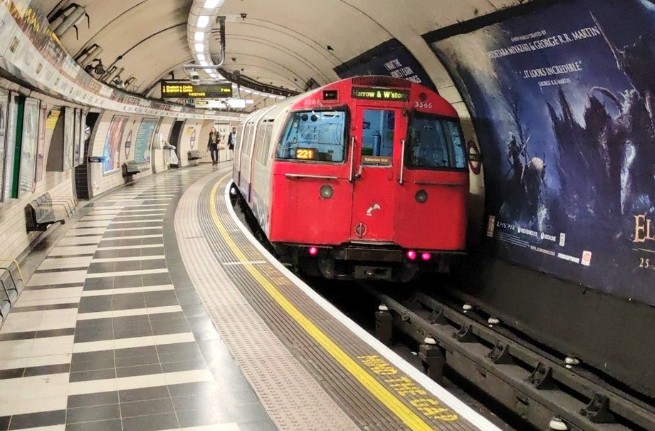London Transport at a Standstill: London Underground Strikes Loom
London’s commuters are bracing for a week of severe disruption as the long-running dispute between Transport for London (TfL) and Tube drivers’ union RMT shows no signs of resolution.
The planned strikes threaten to bring London Underground services to a halt between Monday and Thursday next week, with limited service on Sunday.
On Wednesday afternoon (August 3), an RMT spokesperson told MyLondon: “We are seeking a revised offer and strikes remain on,” following failed talks over the union’s push for a 32‑hour week versus TfL’s 3.4 per cent pay offer.
The union has made it clear that it will not compromise on reducing working hours. TfL, however, has labelled the proposal “neither practical nor affordable.”
Travel by rail towards Central London will be severely disrupted this weekend with these works as the Wimbledon area is affected
There’s also an underground strike starting on Sunday pmhttps://t.co/NXC5PxpLEa
There is also a line closure from Wimbledon to Kings X https://t.co/VTepva5D5V
— Kingston & Surbiton Greens (@RBKgreens) September 5, 2025
With both sides standing firm, the strikes set for Sunday, 7 September to Thursday, 11 September are currently on track unless an agreement is reached by Friday night.
Last-minute cancellations of Tube strikes have happened before. But even if a deal is struck over the weekend, avoiding disruption entirely could prove difficult.
The strikes are expected to affect all London Underground lines, though the Elizabeth line and London Overground are unaffected, as those drivers belong to a different union.
The RMT has previously criticised TfL for what it calls a “dismissive approach” to negotiations.
Management’s failure to address concerns over wages, extreme shift patterns, fatigue, and working hours has, according to the union, “fuelled widespread anger and distrust among the workforce.”
RMT general secretary Eddie Dempsey said: “[Members] are not after a king’s ransom, but fatigue and extreme shift rotations are serious issues impacting on our members’ health and wellbeing – all of which have not been adequately addressed for years by LU management.”
In a staff email reported by the Evening Standard, Nick Dent, TfL’s director of London Underground customer operations, said the pay budget is better spent increasing salaries than reducing hours.
The organisation claims that a reduction in contractual hours could cost tens of millions of pounds, despite measures already in place to combat fatigue.
TfL COO Claire Mann added: “We welcome further engagement with our unions about fatigue and rostering across London Underground, but a reduction in the contractual 35-hour working week is neither practical nor affordable.”
The last major intervention by the Mayor of London, Sadiq Khan, came in 2024 when a £30 million deal prevented a strike, giving the lowest-paid staff an 11 per cent boost.
According to research from the Centre for Economics and Business Research, next week’s planned action could cost London’s economy around £230 million.
Strike Schedule
- Sunday 7 September: Limited Underground services. Customers are advised to complete journeys by 6pm.
- Monday 8 – Thursday 11 September: Minimal or no service. Any running trains will start after 8am.
- Tuesday 9 & Thursday 11 September: DLR closed.
- Friday 12 September: Services begin from 8am, full service expected late morning.
TfL urges commuters to plan ahead:
- Use buses, the Elizabeth line, or Overground services, but expect delays and overcrowding.
- Walk or cycle for short journeys. Dockless bikes and e-scooters can help during peak hours.
- Check live updates before travel. Some stations may close due to staff shortages.
- Work from home if possible. Consider alternative routes and leave extra travel time.
Tube drivers earn an average of £65,179 annually, with advanced operators at £75,677. Regular overtime can see hourly pay rise to £44.62, with advanced drivers earning £49.
By comparison, London bus drivers earn £31,000–£37,440 per year. Elizabeth line drivers now earn £75,000 annually after a February deal.
Events affected
The strike has forced some event rescheduling. Coldplay had to move their Wembley Stadium shows, citing the impossibility of transporting 82,000 fans without a Tube service.
The Sunday concert will now take place on Saturday 6 September, and the Monday show has been pushed to Friday 12 September.
Since hybrid working became widespread, strikes have slightly less economic impact, but central London businesses, particularly in the night-time economy, are still expected to feel the strain.
The Centre for Economics and Business Research warns that the real cost—including indirect effects—could exceed £230m, with around 700,000 lost working days.
Commuters are advised to check travel updates and plan carefully during the London Underground strikes next week.






